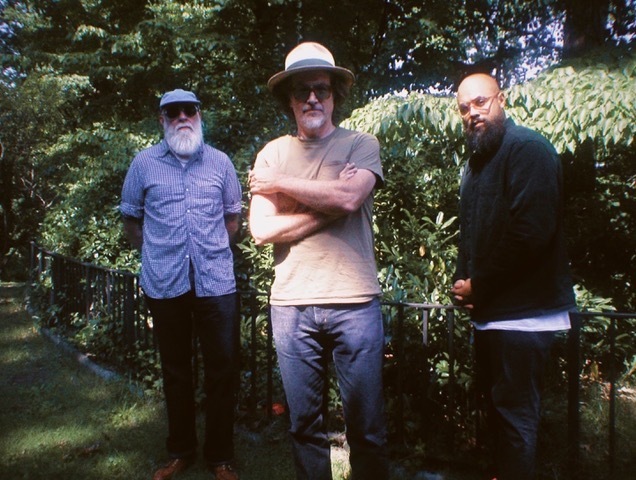
BASIC, a mind-meld between Chris Forsyth, his frequent running partner Douglas McCombs, and Mikel Patrick Avery, present complex and entrancing instrumental music, recasting forgotten scraps of guitar history into a moving mosaic of strings, skins and electronics.
Back in the mid ’80s (a moment in music history as remote to us now as bebop was to us back then), there was an entire sub-genre spawned by prog-rock-gone-new-wave icons meeting up to make sounds, their names reading like a panoply of druggy law firms: Manzanera & Bruford, Fripp & Summers, French/Frith/Kaiser/Thompson. Their records clogged pre-internet college radio playlists, cut-out bins and public library shelves, but served as a touchstone for heads seeking inspiration from deeper wells than FM rock radio (which was fixated, then as now, on the Eagles and Led Zeppelin). Far from being mere self-indulgences, these “side projects” were, at best, outlets for exploration of then-novel technologies (looping, drum programming, sampling, etc.) for creators otherwise stuck in ’70s projects moribund with fan expectations and music-biz balance sheets.
One such record is guitarist Robert Quine and drummer Fred Maher’s Basic, an arachnidian weave of subtly shifting rhythm tracks and chiming guitar that, true to its name, was left largely untouched by Quine’s celebrated McLaughlin-through-a-cheese grater solos (a trait that did not please many critics at the time). Quine’s untimely passing has since awakened many to the joys hidden within his scant solo discography, but more expansive ears were already tuned in, including a few guitarists hungry for sounds outside of the second-hand pentatonic canon—among them, Chris Forsyth and original (now departed) BASIC member Nick Millevoi.
According to Forsyth, “I’ve loved that record for 20-plus years and hardly ever met anyone that liked it. To me, that is an incredibly personal, beautiful, one-of-a-kind record.”
Forsyth and Millevoi’s mutual love of Basic ran deep enough for the album to serve as a template for a run of low-key pandemic jam sessions (when Forsyth’s Solar Motel Band was sidelined from touring). Using an Alesis drum machine for rhythm tracks, they forged a collaborative language from angular polyrhythms, pulsing baritone-guitar lines, and shimmering chorus-pedal washes (another stylistic nod, this time to the glistening post-punk of the Durutti Column and numerous 4AD bands).
After playing as a duo for a brief time, the music demanded further complexity within the sonic substrate. Natural Information Society core member Mikel Patrick Avery was enlisted on drum kit—a setup that quickly morphed into a single drum, bell, and a bespoke electronics rig of his own creation. Upon the release of This Is BASIC in September 2024, Nick departed the group and Tortoise co-founder Douglas McCombs joined in his place on Fender Bass VI. The trio quickly flowered into an improvisational swirl of disorienting electronics, hypnotic throb, and dense flanged-guitar harmonics: three unique voices spinning a complex conversation of textures and rhythms.
The name of the nascent trio was, of course, obvious: BASIC, capitalized to distinguish themselves from the inspirational Quine/Maher text, and to introduce connotations with another ’80s trope, the obsolete programming language some of us learned back when you learned such things. BASIC, more importantly, denotes returning to one’s roots—in this case, Philly living room jams tangential to bands, arrangements, and songs; loved LPs lost to history, but not to the minds conceiving the music. To end with Mikel: “There’s universality without sacrificing identity or integrity. The music allows space for different minds to live within it.” Which, after all, is the most basic offering music has for anyone.

